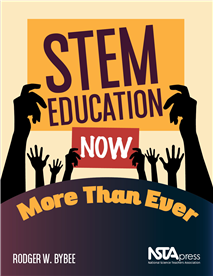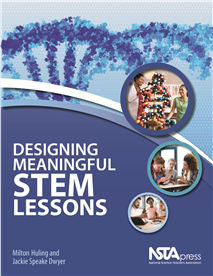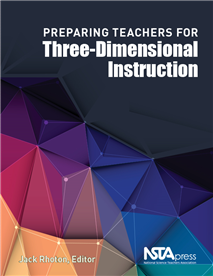All Book Chapters
Book Chapter
Developing Innovative STEM Units
This chapter moves from discussing ideas about designing STEM units to focusing on their development. It begins with a discussion of an integrated approach to STEM instruction, which is one of the innovations of the units proposed. Next, it shares a ...
Book Chapter
Perspectives on Professional Learning for STEM Units
This chapter presents criteria for potential contemporary STEM units and the complementary professional learning. The discussion provides a foundation and context for a professional learning institute where teachers actually design and develop units ...
Book Chapter
Professional Development of STEM Units
This chapter addresses the connection of professional learning to the development and implementation of STEM units. The plan centers on teachers developing, field testing, and implementing the units, all with professional guidance and support. The pr...
Book Chapter
Innovations and Opportunities for STEM Education
STEM represents an innovative approach to school programs. Although there is a history of innovation in American education, STEM is unique in that it incorporates concepts, practices, contexts, and competencies for the 21st century. Chapters 17 and 1...
Book Chapter
Designing Meaningful STEM Lessons (book sample)
Sure, there are lots of cool STEM activities you can use in class. But do they really help your students learn science? This book shows you how to take lessons you’re already familiar with and, through small changes, do what the title says: Design ...
Book Chapter
STEM Education Now More Than Ever (Book Sample)
In response to “these unconventional and uncertain years,” veteran educator Rodger W. Bybee has written a book that’s as thought-provoking as it is constructive. Now more than ever, he writes, America needs reminders of both the themes that mad...
Book Chapter
Implementing Pedagogical Approaches to Support Students in Science Practices
This chapter, by Kenneth L. Huff, establishes a contemporary view of science practices. It begins by providing a brief historical perspective of the role inquiry has played in the emergence of current practices. Then, a discussion on how phenomenon-b...
Book Chapter
This chapter, by Zong Vang, Eric Brunsell, and Elizabeth Alderton, addresses the inclusion of scientific argumentation in elementary classrooms and its connection to the Next Generation Science Standards (NGSS). It begins by discussing the importanc...
Book Chapter
This chapter, by Mary Colson, explores changes to instructional planning that support three-dimensional learning, including specific techniques for helping students figure out possible explanations for observable phenomena and to engage in robust dis...
Book Chapter
This chapter, by Tricia Shelton, examines the use of explanatory arguments for empowering students to construct their own understanding of scientific concepts. High school students are guided by their own questions as they gather and make sense of da...
Book Chapter
Assessment That Reflects the Three Dimensions of the NGSS
This chapter, by Susan German, addresses the importance of explicitly teaching crosscutting concepts, adding scientific argumentation to assessment, and redesigning assessments to move students toward attaining the performance expectations outlined i...
Book Chapter
Promising Professional Learning: Tools and Practices
This chapter, by Rodger W. Bybee, James B. Short, and Dora E. Kastel, explores professional learning strategies and emphasizes the importance of assessing instructional materials for both quality and Next Generation Science Standards (NGSS) alignmen...
Book Chapter
Preparing Teachers to Successfully Implement the Three Dimensions of the NGSS
This chapter, by David T. Crowther and Susan Gomez Zwiep, briefly outlines the challenges faced by leaders seeking to design and execute professional development that enables science educators to successfully implement the Next Generation Science Sta...
Book Chapter
This chapter, by Kevin J. B. Anderson, shares examples from experiences that support teacher professional learning about scientific arguments based on evidence. The chapter also delves into strategies to help teachers build formative and summative as...
Book Chapter
Examining Student Work and Interactions That Reflect the NGSS
This chapter, by Deb M. Kneser, discusses the collaborative analysis of student work as an effective method of professional development. By engaging in a collaborative review of student work, science educators can analyze the learning experiences the...




